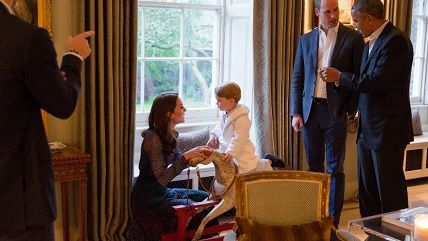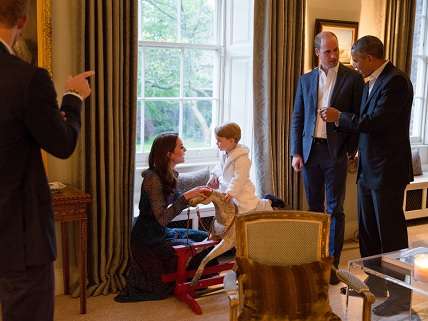Obama Urges Britain to Remain in European Union, Says UK Could Go to Back of Trade Deal Line
London Mayor Boris Johnson blames Obama's position on "ancestral dislike" for British empire


In London for a three day trip coinciding with the Queen's birthday and a heated campaign over a referendum on European Union membership set for June, President Obama urged Brits to remain in the European Union.
"As citizens of the United Kingdom take stock of their relationship with the EU, you should be proud that the EU has helped spread British values and practices–democracy, the rule of law, open markets–across the continent and to its periphery," the president wrote in an op-ed in The Telegraph. "The European Union doesn't moderate British influence–it magnifies it."
The president defended the post-World War 2 order, lumping the European Union in with the United Nations, NATO, Bretton Woods (meaning the IMF, World Bank, and WTO), and the Marshall Plan.
"Their efforts provided a foundation for democracy, open markets, and the rule of law, while underwriting more than seven decades of relative peace and prosperity in Europe," the president said. "Today, we face tests to this order–terrorism and aggression; migration and economic headwinds–challenges that can only be met if the United States and the United Kingdom can rely on one another, on our special relationship, and on the partnerships that lead to progress."
The "special relationship," the president noted in a later press conference, wouldn't stop the United Kingdom from being "at the back of the queue" on trade deals if it weren't part of the European Union. "No man is an island," the president said while in the island nation.
President Obama pinned the decision on Britain's future in the European Union to a wider set of concerns about terrorism, climate change, income inequality, jobs, and trade and an assumption of specific partisan solutions, which doesn't seem to help the cause of the "Remain" campaign, which is trying to dispel fears of loss of sovereignty that animates the "Leave" side.
Packaging partisan presumptions into the benefits of EU membership is an argument against it. The EU has a "long-running problem with voters," as euronews called it, and pitching membership in the EU as consensus on issues where consensus on policy doesn't actually exist supports skepticism about the project of European integration.
Supporters of the "Leave" campaign, led by London Mayor Boris Johnson, lambasted Obama for involving himself in the debate. In an op-ed in The Sun, Johnson pointed out the EU "generates 60 percent of all the laws that pass through Westminster" and was costing the United Kingdom $500 million a week. He rejected the idea that British influence was magnified by the EU, saying the country had been outvoted 40 times in the last five years. Neither had membership with the EU, Johnson argued, secured a U.S. trade deal for the U.K.
Johnson called Obama "downright hypocritical," pointing out the U.S. would never accept an arrangement like the European Union and "guards its democracy with more hysterical jealousy than any other country on earth." The U.S., Johnson noted, was the only country that hadn't signed U.N. conventions on children and women.
Unfortunately for Johnson, he led with a debunked story about a Winston Churchill bust and suggested the half-Kenyan Obama's "ancestral dislike of the British empire" informed his thought process. In Britain President Obama scores approval ratings in the 70s. Americans and Brits largely set aside any "ancestral dislikes" long ago. Whether Obama's personal popularity translates to the issue of EU membership, on which polls find British voters more or less evenly split, remains to be seen.
